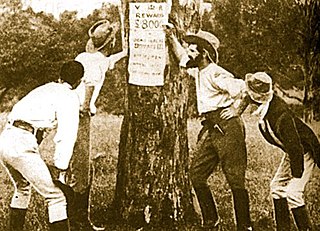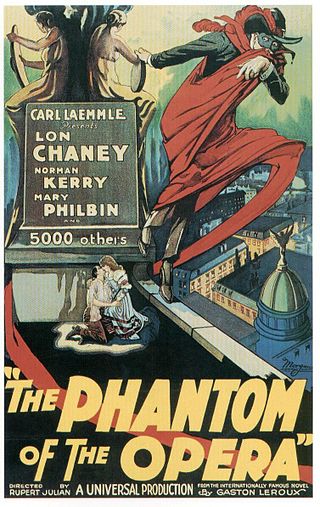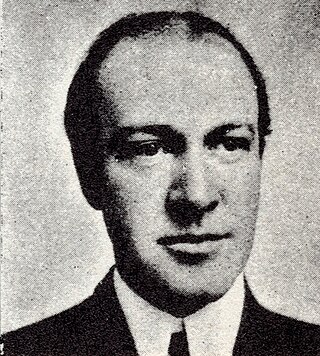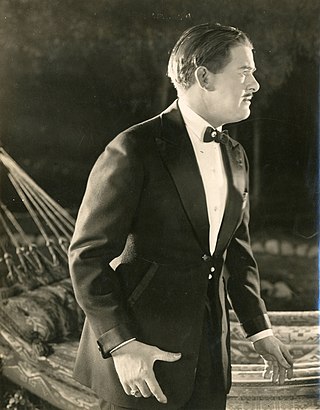
Universal City Studios LLC, doing business as Universal Pictures is an American film production and distribution company, a division of Universal Studios, which is owned by NBCUniversal, a division of Comcast.
The year 1909 in film involved some significant events.

The year 1906 in film involved some significant events.

Florence Lawrence was a Canadian-American stage performer and film actress. She is often referred to as the "first movie star", and was long thought to be the first film actor to be named publicly until evidence published in 2019 indicated that the first named film star was French actor Max Linder. At the height of her fame in the 1910s, she was known as the "Biograph Girl" for work as one of the leading ladies in silent films from the Biograph Company. She appeared in almost 300 films for various motion picture companies throughout her career.

The Phantom of the Opera is a 1925 American silent horror film adaptation of Gaston Leroux's 1910 novel Le Fantôme de l'Opéra, directed by Rupert Julian and starring Lon Chaney in the title role of the deformed Phantom who haunts the Paris Opera House, causing murder and mayhem in an attempt to make the woman he loves a star. The film remains most famous for Chaney's ghastly, self-devised make-up, which was kept a studio secret until the film's premiere. The picture also features Mary Philbin, Norman Kerry, Arthur Edmund Carewe, Gibson Gowland, John St. Polis and Snitz Edwards. The last surviving cast member was Carla Laemmle (1909-2014), niece of producer Carl Laemmle, who played a small role as a "prima ballerina" in the film when she was about 15 years old. The film was released on September 6, 1925, premiering at the Astor Theatre in New York. The film's final budget was $632,357.

Carl Laemmle was a German-American film producer and the co-founder and, until 1934, owner of Universal Pictures. He produced or worked on over 400 films.

Universal City or Universal Studios Complex is an unincorporated area within the San Fernando Valley region of Los Angeles County, California, United States. Approximately 415 acres, within and immediately outside the area is the property of Universal Pictures, one of the five major film studios in the United States: about 70 percent of the studio's property is inside this unincorporated area, while the remaining 30 percent is within the Los Angeles city limits. Universal City is nearly surrounded by Los Angeles, with the area's northeastern corner touching the city of Burbank.

Carl Laemmle Jr. was an American film producer - studio executive and heir of Carl Laemmle, who had founded Universal Studios. He was head of production at the studio from 1928 to 1936.
The star system was the method of creating, promoting and exploiting stars in Hollywood films from the 1920s until the 1960s. Movie studios would select promising young actors and glamorise and create personas for them, often inventing new names and even new backgrounds. Examples of stars who went through the star system include Cary Grant, Joan Crawford, and Rock Hudson.

The Independent Moving Pictures Company (IMP) was a motion picture studio and production company founded in 1909 by Carl Laemmle. The company was based in New York City, with production facilities in Fort Lee, New Jersey. In 1912, IMP merged with several other production companies to form Universal Film Manufacturing Company, later renamed Universal Pictures Company with Laemmle as president.

Henry Lewis Solter was an American silent film actor, screenwriter and director.

Laemmle Theatres is a group of family-run arthouse movie theaters in the Los Angeles area. It was established in 1938 and is owned and operated by Robert Laemmle and his son Greg Laemmle.

Jennifer Shrader Lawrence is an American actress. She is known for starring in both action film franchises and independent dramas, and her films have grossed over $6 billion worldwide. The world's highest-paid actress in 2015 and 2016, she appeared in Time's 100 most influential people in the world list in 2013 and the Forbes Celebrity 100 list from 2013 to 2016.
Biograph Girl was a phrase associated with two early-20th-century actresses, Florence Lawrence and Mary Pickford, who made black-and-white silent films with the Biograph Company. At that time, all studios refused to give actors on-screen film credit; they did not want them to gain public celebrity status and command higher salaries. This had already happened with stage actors, and the studios did not want to repeat the trend on film.

Raymond Cannon was an American actor, film director, screenwriter, journalist, and author known for his work with D. W. Griffith and Buster Keaton.

Broken Mirrors is a 2019 Israeli drama film written and directed by Imri Matalon and Aviad Givon and starring Shira Haas. The film had its world premiere at the 2018 Rome Film Festival as part of the competition at the 18th edition of Alice in the City section. Broken Mirrors was nominated for three Ophir Awards, and it won the Jury Prize at the 2019 SCHLINGEL International Film Festival. The film is distributed in Israel by United King Films and internationally by Wazabi Films.

The Champion Film Company was an independent production company founded in 1909 by Mark M. Dintenfass. The studio was one of the film companies that merged to form Universal Pictures.

Doctor Neighbor is a 1916 American silent feature film black and white melodrama. The film was directed by Lloyd B. Carleton. It stars Hobart Bosworth and pairs Dorothy Davenport and Emory Johnson in leading roles.

The Yaqui is a 1916 American silent Black and white Melodrama directed by Lloyd B. Carleton and starring Hobart Bosworth, Gretchen Lederer and Emory Johnson. The film depicts Yaqui Indians entrapped by nefarious elements into enslavement for a wealthy plantation owner. They struggle in captivity, eventually rebelling against their owner's oppression.

The Human Gamble was a 1916 American silent Short film directed by Lloyd B. Carleton. The film is based on the story and screen adaptation by Calder Johnstone. The drama stars Dorothy Davenport, Emory Johnson, and a cast of Universal contract players.

















